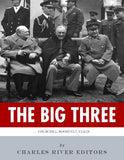The Borgias: The Lives and Legacies of Rodrigo, Cesare, and Lucrezia Borgia
ISBN: 9781985027763
$9.99
*Analyzes the Borgias' legacies and how it endured over the centuries.
*Examines the legends and rumors surrounding the Borgias in an attempt to separate fact from fiction.
*Includes pictures depicting the Borgias and important people and places in their lives.
*Includes a Bibliography for further reading.
“Alexander never did what he said. Cesare never said what he did.” – Italian Proverb
The stories and legends attributed to the Borgias have made them one of the most notorious families in history. 500 years after their deaths, they have come to be associated more with incest, political intrigue, murder and state-sponsored violence. While 21st century TV series have cast the Borgias as the first organized crime family, the rumors spread by the family’s political opponents in the late 15th century have taken hold among a fascinated public. Did Cesare really have an incestuous relationship with sister Lucrezia? Did the pope really throw lavish orgies?
While Rodrigo may not have been as colorful or criminal as the enduring legends, there is no question he was manipulative, ruthless and, ultimately, effective. From an administrative standpoint, Rodrigo was a success as Pope Alexander VI, with a big assist from son Cesare. In one of the most famous political treatises in history, Niccolo Machiavelli famously advises those who hold power that it is better to be feared than loved. Though he uses Cesare as a cautionary tale about acquiring power through the good-will and powers of another person (his father, Pope Alexander VI), it is clear in The Prince that Machiavelli holds out Cesare as a skillful, effective ruler and administrator. In many ways, Cesare has been characterized as the “prince” Machiavelli tells his readers to be. As one translator of The Prince put it, Cesare is “cited as a type of the man who rises on the fortune of others, and falls with them; who takes every course that might be expected from a prudent man but the course which will save him; who is prepared for all eventualities but the one which happens; and who, when all his abilities fail to carry him through, exclaims that it was not his fault, but an extraordinary and unforeseen fatality.”
*Examines the legends and rumors surrounding the Borgias in an attempt to separate fact from fiction.
*Includes pictures depicting the Borgias and important people and places in their lives.
*Includes a Bibliography for further reading.
“Alexander never did what he said. Cesare never said what he did.” – Italian Proverb
The stories and legends attributed to the Borgias have made them one of the most notorious families in history. 500 years after their deaths, they have come to be associated more with incest, political intrigue, murder and state-sponsored violence. While 21st century TV series have cast the Borgias as the first organized crime family, the rumors spread by the family’s political opponents in the late 15th century have taken hold among a fascinated public. Did Cesare really have an incestuous relationship with sister Lucrezia? Did the pope really throw lavish orgies?
While Rodrigo may not have been as colorful or criminal as the enduring legends, there is no question he was manipulative, ruthless and, ultimately, effective. From an administrative standpoint, Rodrigo was a success as Pope Alexander VI, with a big assist from son Cesare. In one of the most famous political treatises in history, Niccolo Machiavelli famously advises those who hold power that it is better to be feared than loved. Though he uses Cesare as a cautionary tale about acquiring power through the good-will and powers of another person (his father, Pope Alexander VI), it is clear in The Prince that Machiavelli holds out Cesare as a skillful, effective ruler and administrator. In many ways, Cesare has been characterized as the “prince” Machiavelli tells his readers to be. As one translator of The Prince put it, Cesare is “cited as a type of the man who rises on the fortune of others, and falls with them; who takes every course that might be expected from a prudent man but the course which will save him; who is prepared for all eventualities but the one which happens; and who, when all his abilities fail to carry him through, exclaims that it was not his fault, but an extraordinary and unforeseen fatality.”




